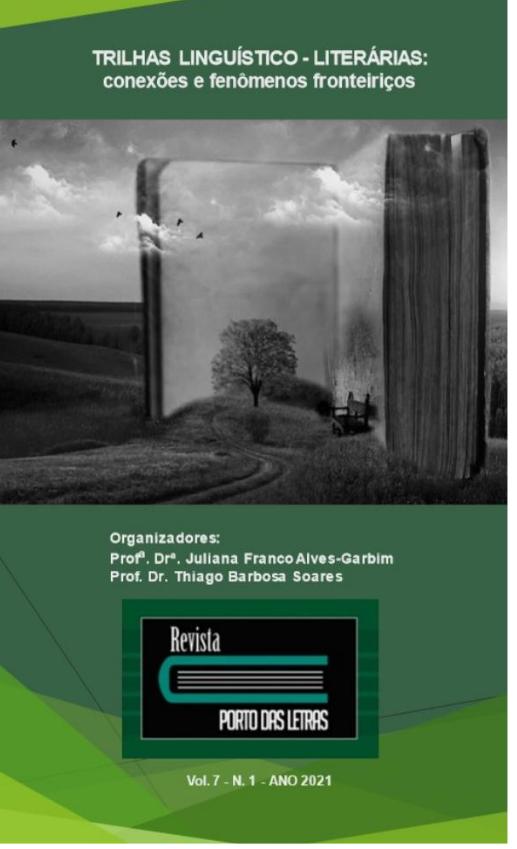A gamificação na era da cultura digital
uma proposta didática para o ensino de Língua Inglesa
Keywords:
Gamificação na educação; Games e educação; Ensino e aprendizagem de línguas; Ensino de Língua Inglesa.Abstract
This work presents an investigation on the influence of games on the daily lives of the digital natives. It is proposed from this research, reflections on the phenomenon of gamification applied to education and its possibilities of insertion in didactic proposals for English Teaching. The intention was to problematize and contextualize this phenomenon from the reality experienced by high school students and, from this contribution, suggest possibilities of gamification application in English language teaching. This contextualization was based on the results of dialogues and issues from a gathering of data, carried out with integrated high school students, which investigated the interest of these students for games, in addition to its possible applicability in the classes. Afterwards the considerations that started from gathering of data, a path was proposed for the construction of gamified didactic proposals, as well as a reflection on the possible combination of gamification with the Task-Based Language Teaching Approach (TBLT - Task Based Learning Teaching) simultaneous with the use of digital technological resources. Beyond the discussions, the intention is to contribute to the construction of innovative English Language teaching proposals, aimed the motivation and engagement of the students that belong to the digital culture age, to a more significant, effective and critical participation in English language classes.
References
BEZERRA, D. de S. Políticas e planejamento do ensino médio (integrado ao técnico) e da língua estrangeira (inglês): na mira(gem) da politecnia e da integração. 2012. Tese de Doutorado. Universidade de São Paulo. Disponível em: https://teses.usp.br/teses/disponiveis/48/48134/tde-05022013-105725/publico/DANIELLA_DE_SOUZA_BEZERRA_rev.pdf > acesso em: 27 out. 2018.
DETERDING, S. Gamification: designing for motivation. Interactions, v.19, n. 4, p. 14-17, jul./ago., 2012. Disponível em: <https://dl.acm.org/doi/fullHtml/10.1145/2212877.2212883> acesso: set. 2019.
DETERDING, Sebastian et al. From game design elements to gamefulness: defining" gamification". In: Proceedings of the 15th international academic MindTrek conference: Envisioning future media environments. 2011. p. 9-15. Disponível em: <https://dl.acm.org/doi/pdf/10.1145/2181037.2181040> Acesso: set. 2019.
FINARDI, K. R.; PORCINO, M. C. Tecnologia e metodologia no ensino de inglês: impactos da globalização e da internacionalização. Ilha Desterro, n. 66, p. 239-283, 2014. Disponível em: <file:///C:/Users/Alana/Downloads/Tecnologia_e_Metodologia_no_Ensino_de_Ingles_Impac.pdf >acesso em 13 set de 2018.
FLICK, U. Introdução à pesquisa qualitativa. Porto Alegre: Artmed, 2009.
FREIRE, Paulo. Pedagogia do oprimido. 46ed. Rio de Janeiro: Paz e Terra, 2005.
GEE, J. P. What video games have to teach us about learning and literacy. Computers in Entertainment (CIE), 2003. Disponível em: <https://blog.ufes.br/kyriafinardi/files/2017/10/What-Video-Games-Have-to-Teach-us-About-Learning-and-Literacy-2003.-ilovepdf-compressed.pdf> acesso em: 06 out. 2019.
______. Learning and games. The ecology of games: Connecting youth, games, and learning, v. 3, p. 21-40, 2008. Disponível em: <https://ase.tufts.edu/DevTech/courses/readings/Gee_Learning_and_Games_2008.pdf> acesso em: 27 out. 2019.
GASKELL, G. Entrevistas individuais e grupais. In: BAUER, Martin W.; GASKELL, George. Pesquisa qualitativa com texto, imagem e som: um manual prático. Editora Vozes Limitada, 2008.
KAPP, K. The gamification of learning and instruction: game-based methods and strategies for training and education. Pfeiffer, 2012.
KRASHEN, S. Principles and practice in second language acquisition. University of Southern California, 2009.
LEFFA,V. Redes sociais: ensinando línguas como antigamente. In: ARAÚJO, J.; LEFFA, V. (Orgs.) Redes sociais e ensino de línguas: o que temos de aprender. 1 ed. São Paulo: Parábola Editorial, 2016.
______. Gamificação adaptativa para o ensino de línguas. In: Congresso Ibero-Americano de Ciência, Tecnologia, Inovação e Educação. Buenos Aires. Anais, p. 1-12, 2014. Disponível: <http://www.leffa.pro.br/textos/trabalhos/Gamificacao_Adaptativa_Leffa.pdf > acesso em: 02 nov. 2018.
LEFFA, V.; PINTO, C. M. Aprendizagem como vício: o uso de games na sala de aula. Revista (Con) textos Linguísticos, v. 8, n. 10.1, p. 358-378, 2014. Disponível em: <http://www.leffa.pro.br/textos/trabalhos/Aprendizagem_vicio.pdf > 09 nov. 2018.
LOPES, L. P. da M. Linguagem, interação e formação do professor. Revista Brasileira de Estudos Pedagógicos, v. 75, n. 179-80-81, 2007. Disponível em: <https://periodicos.ufsm.br/LeC/article/view/30363> acesso em: 22 nov. 2018.
PRENSKY, M.; BERRY, B. D. Do they really think differently. On the horizon, v. 9, n. 6, p. 1-9, 2001. Disponível em <https://www.marcprensky.com/writing/Prensky%20-%20Digital%20Natives,%20Digital%20Immigrants%20-%20Part2.pdf> acesso em: em: 15 nov. 2018.
______. The motivation of gameplay: The real twenty-first century learning revolution. On the horizon, v. 10, n. 1, p. 5-11, 2002. Disponível em: <http://www.marcprensky.com/writing/Prensky%20-%20The%20Motivation%20of%20Gameplay-OTH%2010-1.pdf> acesso em: 03 nov. 2018.
______. Digital natives, digital immigrants. Part 1. On the horizon, v. 9, n. 5, p. 1-6, 2001. Disponíveil em: <https://www.marcprensky.com/writing/Prensky%20-%20Digital%20Natives,%20Digital%20Immigrants%20-%20Part1.pdf> acesso em: 09 nov. 2018.
______. Digital game-based learning. Computers in Entertainment (CIE), v. 1, n. 1, p.21-21, 2003. Disponível em: <http://www.marcprensky.com/writing/Prensky%20-%20Ch2-Digital%20Game-Based%20Learning.pdf > acesso em: 02 nov. 2018.
RODRÍGUEZ-BONCES, M., & Rodríguez-Bonces, J. (2010). Task-based language learning: old approach, new style. A new lesson to learn. Profile Issues in Teachers Professional Development, 12(2), 165-178. Disponível em: <http://www.scielo.org.co/pdf/prf/v12n2/v12n2a11.pdf> acesso em: 02 ago. 2019.
TRIVIÑOS, A. N. S. Introdução à pesquisa em ciências sociais: a pesquisa qualitativa em educação. São Paulo: Atlas, 2009.
WARSCHAUER, M. A developmental perspective on technology in language education. TESOL quarterly, v. 36, n. 3, p. 453-475, 2002. Disponível em: <http://education.uci.edu/uploads/7/2/7/6/72769947/developmental1.pdf> Acesso em: 06 ago. 2019.
WERBACH, K.; HUNTER, D. For the win: how game thinking can revolutionize your business. Philadelphia: Wharton Digital Press, 2012.
WILLIS, Jane. A framework for task-based learning. Harlow: Longman, 1996.
WILLIS, Jane. A flexible framework for task-based learning. Challenge and change in language teaching, p. 52-62, 1996. Disponível em: <https://d1wqtxts1xzle7.cloudfront.net/57602146/A_flexible_framework_for_task-based_lear.pdf?1540087231=&response-content-disposition=inline%3B+filename%3DA_flexible_framework_for_task-based_lear.pdf&Expires=1591925215&Signature=BzqhVtWIMQ3HT~MDKv10AhzMNdYERiIKgYJ4UmbP0yt3cJ9XGnjWr10FcC8DEGEizIC26eBdE71oErZ3IZ3s6CB3uAswJijaUxB1YQ6GCFtcnZKScimmqtLjBPR0IEnu3WrMJbd-lYjgUrVWSvM-deZpphCfU6HiP26oqkxIvI0ZQ-ikcaObZF3lfjy2WAOm5bjExvH7AsUqFKIkJUkqmIfAvidtodK4UY5xVUKgjv87WyyfCS6QZ9iauFo8FsTUViIHbpME8chIA2NeZy8WEZpxMFcLEsSSkucxGsH~0488LUs1GpLa4DcLipMO1~wQRQNPNyNoLibislbtP24m0A__&Key-Pair-Id=APKAJLOHF5GGSLRBV4ZA> acesso em: 02 set. 2019.
RICHARDS, J.–ROGERS; RODGERS, S. T. (2014).Third Ed. Approaches and methods in language teaching.
ZABALA, Antoni. A prática educativa: como ensinar. Penso Editora, 2015.
SAKUDA, Luiz Ojima; FORTIM, Ivelise. II censo da indústria brasileira de jogos digitais. Ministério da cultura e Homo-Ludens: São Paulo. Disponível em<http://www.cultura.gov.br/feed-geral/-/asset_publisher/G7Zpw3dqBUVE/content/2%C2%BA-censo-da-industria-brasileira-de-jogos-digitais-aponta-crescimento-de-games-no-brasil/10883>acesso em: 09/12/2019.
WIJMAN, T. Global Games market revenues 2018| Per Region and Segment| Newzoo. 2018. Disponível para download em<https://developer.amazon.com/blogs/appstore/post/8bd19103-d51c-4ecf-bbb5-9dd4b7dc5a8b/free-download-2018-global-games-market-report-by-newzoo> acesso em: 12/02/2020.
Downloads
Published
How to Cite
Issue
Section
License
Os autores concordam com os termos da Declaração de Direito Autoral, que se aplicará a esta submissão caso seja publicada nesta revista (comentários ao editor podem ser incluídos a seguir).

